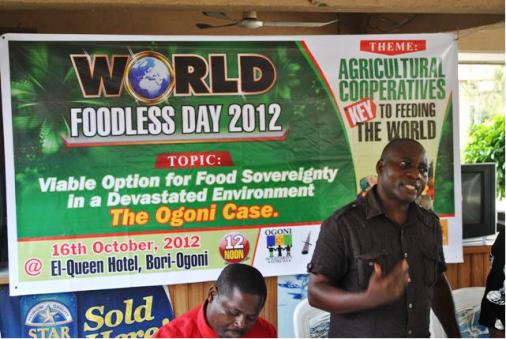As the International Community gathered to mark the World Food Day last October 16, 2012, the future and destiny of the over 1.2 million Ogoni people hangs in the balance as food crops and fishes do not grow and breed in the air but on land and water which they don’t have any more.
To the Ogoni, a distinct ethnic nationality in the oil rich but impoverished and heavily polluted Niger Delta region of Nigeria, the day was a celebration of what they prefer to call “World Foodless Day” and a day of hunger. Farmers, civil society actors, community leaders, women and youth groups across the six the Kingdoms of Ogoni met at Bori, the traditional Headquarters of the Ogoni people to deliberate on viable options to food sovereignty in a devastated and polluted environment like theirs.
At the event which was organized by Ogoni Solidarity Forum (OSF) in collaboration with OilWatch Africa, Social Action and Peoples Coalition for Food Sovereignty (PCFS), participants lamented that despite the fact that oil related environmental damage in the Niger Delta has continued to pose numerous threats to climate, people, the environment, livelihoods and rural development, the 2013 Budget recently presented by President Goodluck Jonathan only gave marginal attention to food production and Agriculture.
According to them, “it was wrong for the President Jonathan led federal government to have used the budget to launch a gas and oil revolution policy as a way of securing improved economic growth when the same government is yet to address the frightening recommendations from the UNEP report on Ogoni, a year after its release.
To them, the problem of hunger in Ogoniland, like several communities in the Niger Delta, was easy to address prior to the advent of oil companies. Of course, access to protein and other vital nourishment from food, vegetables, and traditional crops such as cassava, cocoyam, plantain, and fruits were in abundance in and around the villages. Fish and bush meat were equally reliable sources of healthy life for rural people. Regrettably, the people that once boast of being a food basket in Nigeria now go to bed on empty stomach.
While condemning a world system that promotes the corporatization of Agriculture and commodification of land and other resources, Participants noted: that access to food was a fundamental human right for every citizen of the world including the economically dispossessed Ogoni people
that hunger in Ogoniland is caused mainly by years of oil production activities by Shell and land grabbing by the Rivers State Government.
that refusal of government of Nigeria to implement UNEP recommendations on Ogoni was causing the people untold hardship and hunger
that the recent and ongoing flooding of parts of the Niger Delta region was man made and will worsen food crisis/ hunger in the region, and by implication, the Ogoni will suffer the more.
Participants commended Ogoni Solidarity Forum, OilWatch Africa, Social Action and Peoples Coalition for Food Sovereignty (PCFS) for organizing the first World Food Day in Ogoniland and also extended appreciation to Environmental Rights Action/Friends of the Earth Nigeria, KebetKache Women Development & Resource Centre Nigeria and other organizations that sent solidarity message to the August gathering.
Among other things, participants resolved to:-
1. mobilize farmers and fishers in Ogoni farmers under the umbrella of Ogoni Farmers Association.
2. celebrate the yearly “World Foodless and Hunger Day” until the world has food sufficiency for the over one billion people that go to bed daily on empty stomach.
3. demand that the federal government of Nigeria should immediately implement recommendations of the Justice Alfa Belgore Committee that recommended an amendment of the Land Use Act to prevent further abuse by state governors like Rotimi Amaechi.
4. demand for immediate return of all seized farm lands in Ogoni including the 2,000 hectares forcefully acquired for the cultivation of a private banana plantation to their owners.
5. demand for immediate implementation of UNEP report including urgent decommissioning by Shell.
6. demand for immediate restoration of ownership, production, control and distribution of food to the people for the benefit of the vulnerable and poor populations.



No Comment